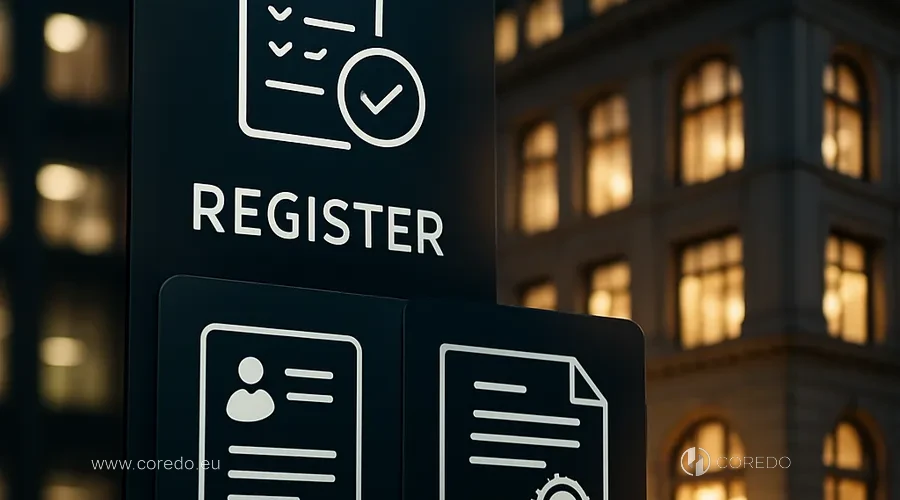In 2025, more than 40% of international holding structures used to manage assets and intellectual property in Europe and Asia are built on BVI International Business Company – and this share is growing every year.
How to register a company in the BVI

For those who are considering how to register a company in the BVI, it is important to understand in advance the specifics of this process and the minimum requirements provided by the islands’ legislation. Before moving on to the concrete steps and required documents, let’s clarify the basic conditions of registration and who can become a founder of a business in the BVI.
Minimum requirements for registration
The basis of BVI company registration is the principle of maximum flexibility: one director and one shareholder are sufficient; they may be the same person and are not required to be BVI residents. This enables sole control over the structure and reduces administrative costs. Unlike many jurisdictions, there is no requirement for a minimum share capital: shares may be issued in any currency, including the US dollar, euro or pound sterling.
Documents for registration
To register an international commercial BVI company you will need:
- Copies of passports and proof of address for all directors and shareholders (KYC package).
- Information about the company’s structure, beneficiaries (UBO), and the intended activities.
- A prepared Memorandum and Articles of Association – the constitutional documents defining the company’s purposes, rights and obligations of the members.
- An application to check and reserve the name (BVI company name requirements: uniqueness, absence of prohibited terms, compliance with international standards).
- Details of the registered office and the registered agent.
How to choose a registered agent
COREDO’s experience confirms: a reliable agent is not just an intermediary, but a strategic partner who ensures compliance, timely updating of corporate information and interaction with regulators. selection criteria:
- An FSC BVI license and a positive market reputation.
- Experience working with international structures, knowledge of AML/CFT requirements.
- Willingness to provide nominee services, a virtual office and assistance with apostilling documents.
Forms and structure of the company

Forms and structure of a company are fundamental concepts that determine in which legal-organizational form a company operates and how its internal relationships, rights and responsibilities of participants are structured. Understanding these aspects helps to correctly choose the optimal structure to achieve business goals and to take into account all legal nuances.
Main forms and structural features
The most in-demand form is the Business Company (BC), analogous to the BVI international commercial company with limited liability. Additionally available:
- Segregated Portfolio Company (SPC), for structuring investment funds.
- Company Limited by Guarantee – for non-profit projects.
- Unlimited Company: specific structures for certain types of activities.
Preparation of constitutional documents and the corporate package
- Certificate of Incorporation, the official registration certificate.
- Register of shareholders and directors.
- Share Certificates, share certificates.
- Corporate Kit – a set of documents for opening bank accounts and interacting with counterparties and regulators.
Compliance and transparency in 2025
Compliance and transparency in 2025 are becoming for businesses not just a legal standard, but a key indicator of trust and company maturity in the market. Tightening requirements for identifying owners and disclosing information bring tools such as shareholder registers to the forefront of corporate governance.
Shareholders’ register
From 2025 BVI is strengthening transparency requirements: the shareholder register must be filed with the official Register within 30 days after registration, and any changes also within 30 days. Information is available only to competent authorities, not published publicly, which helps preserve the confidentiality of BVI company owners.
Annual reporting and Economic Substance requirements
COREDO’s practice has shown that for companies operating in financial services, holding structures, and IP structures, the requirements for economic presence can be met by organizing a virtual office, hiring a local director and conducting operational activities.
AML, KYC and nominee service: what is it?
BVI strictly monitors KYC/AML compliance: the registered agent is required to conduct Due Diligence of all beneficiaries, directors and shareholders. The use of a nominee director and shareholder in BVI is possible, but requires a transparent structure and regular updating of data.
Taxes and banking services

How can I manage tax benefits?
A BVI offshore company is exempt from corporate tax, income tax, capital gains tax, VAT and stamp duty on shares. On the other hand, owners must take into account tax obligations in their country of residence, as well as requirements under Controlled Foreign Corporation (CFC) rules and the Common Reporting Standard (CRS).
Opening a bank account and banking partners
Asset structure and intellectual property
A BVI International Business Company is often used to structure ownership of real estate, securities, patents and trademarks. This allows minimizing tax liabilities, ensuring management flexibility and protection from external risks.
Risks and alternatives

Risk management and its consequences
Owning a BVI company is associated with a number of risks:
- Reputational: increased scrutiny from banks and counterparties, possible restrictions on dealing with certain countries.
- Regulatory: changes in BVI legislation, disclosure requirements, CFC, CRS.
- Operational: difficulties opening accounts, transaction blocking, refusal of service.
- Tax: requirement to declare income, risks of double taxation.
Alternative jurisdictions: comparative analysis
If the BVI does not meet strategic objectives, the COREDO team recommends considering alternative jurisdictions: Singapore, Hong Kong, Cyprus, UAE. Below is a table comparing key reporting and structural requirements:
| Criterion | BVI (2025) | Singapore | Cyprus | UAE (RAK, DIFC) |
|---|---|---|---|---|
| Minimum composition | 1 director, 1 shareholder | 1 director, 1 shareholder | 1 director, 1 shareholder | 1 director, 1 shareholder |
| Share capital | No minimum | No minimum | No minimum | No minimum |
| Taxation | No corporate tax | 17% | 12.5% | 0% (in zones) |
| Economic Substance | Yes (for relevant activities) | Yes | Yes | Yes |
| Annual reporting | Annual Return, Economic Substance | Financial Statements | Financial Statements | Financial Statements |
| beneficial ownership transparency | Private filing (from 2025) | Public (ACRA) | Public (RoC) | Private (register) |
| Banking services | Challenging, depends on the bank | Available | Available | Available |
ROI assessment and key metrics
ROI from registering a BVI company is measured by:
- Reduction of tax burden.
- Flexibility of the corporate structure.
- Simplification of cross-border transactions.
- Protection of assets and intellectual property.
- Opportunities to scale the business.
Step-by-step registration
- Choose the legal form and prepare the business model.
- Check and reserve the BVI company name.
- Collect the KYC document package for directors and shareholders.
- Preparation of the Memorandum and Articles of Association.
- Select and appoint a BVI registered agent.
- Submit documents and register – obtain the Certificate of Incorporation.
- Opening a bank account: prepare the compliance package, apostille the documents.
- Submit the register of shareholders and beneficiaries to the Registrar.
- Set up corporate governance – appoint a nominee director/shareholder (if necessary).
- Fulfill Economic Substance requirements (if necessary).
- File the Annual Return and Economic Substance Report.
Compliance document checklist
- Passport and proof of address for all participants.
- Ultimate Beneficial Owner (UBO) information.
- Constitutional documents (Memorandum and Articles of Association).
- Details of the registered office and registered agent.
- Business plan and description of activities.
- Proof of source of funds (for banks).
- Apostille and legalization of BVI documents (for international operations).
How to Choose a Registered Agent: Checks and Tips
- Check the license and reputation.
- Request references and case studies.
- Assess readiness to support AML/CFT, nominee services, and virtual office.
- Ensure the availability of digital tools for compliance automation.
Banking services and tax planning
- Prepare an extended compliance package.
- Choose banks focused on international structures (Switzerland, Singapore, EU).
- Integrate solutions for managing tax liabilities, taking into account CFC and CRS requirements.
Risk management and compliance
- Regularly update corporate information.
- Use digital KYC/AML platforms.
- Implement corporate governance and process transparency.
- Prepare the structure for possible redomiciliation or an exit strategy.
When to choose alternative jurisdictions
- When it is impossible to open a bank account.
- When requirements for economic presence become stricter.
- When public disclosure of beneficiary information is required.
- When there are specific licensing requirements (banking, insurance, trust activities).
Main conclusions of the article
